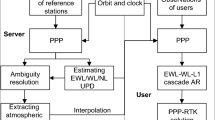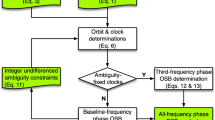Abstract
PPP-RTK (network-based real-time kinematic precise point positioning) can achieve instantaneous centimeter-level positioning using only a single GNSS receiver under the premise of precise satellite orbits, satellite clocks, satellite code/phase biases, and atmospheric corrections. It is usually reported that PPP-RTK needs two or more frequencies of measurements as the phase biases are conventionally defined in terms of wide-lane and narrow-lane combinations. Although single-frequency PPP-RTK has been proven achievable, the signals demonstrated in most open studies are usually limited to specific frequencies such as GPS L1 or similar. However, in GNSS challenging environments, satellite signal losses can repeatedly take place on any frequency, which is likely to disable conventional PPP-RTK algorithms prescribing particular signal frequencies. Therefore, we apply the observable-specific code and phase bias (OSB) concept to PPP-RTK and investigate whether the integer properties of PPP ambiguities on any frequency or frequency combination can be fully recovered after such OSB corrections, i.e., all-frequency PPP-RTK, to address the satellite signal loss problem in GNSS adverse environments. In particular, all-frequency PPP-RTK is able to process any number, any choice, or any combination of GNSS signal frequencies rather than the prescribed frequencies. We carried out both static and vehicle-born experiments using a regional GPS/Galileo/BDS network over seven days. In the static experiment, six signal clusters across the three constellations (i.e., L1/E1/B1C, L5/E5a/B2a, E5b/B2I/B2b, B1I, B3I, and L2/E6) were tried to perform single-frequency single-epoch PPP-RTK. Each cluster of signals (except L2/E6) shares the same frequency (i.e., overlap frequency among constellations). We found that the average ambiguity fixing rate was 95.8% and the mean positioning precisions were 1.9, 1.6, and 5.4 cm in the east, north, and up components, respectively, in terms of RMS errors. In the vehicle-borne experiment, the ambiguity fixing rate at GNSS challenging epochs was improved by 15 percentage points and the horizontal positioning errors were reduced by over 30% when switching from conventional to all-frequency PPP-RTK.








Similar content being viewed by others
Data availability
The precise multi-GNSS satellite orbit and clock products provided by ESA are available at ftp://ftp.gfz-potsdam.de/gnss/products/mgex. The code OSB product provided by CAS is available at ftp://ftp.gipp.org.cn/product/dcb/mgex/.
References
Böhm J, Heinkelmann R, Schuh H (2007) Short note: a global model of pressure and temperature for geodetic applications. J Geod 81(10):679–683
Collins P, Bisnath S, Lahaye F, Heroux P (2010) Undifferenced GPS ambiguity resolution using the decoupled clock model and ambiguity datum fixing. Navigation 57(2):123–135
Gabor MJ, Nerem RS (2002) Satellite-satellite single-difference phase bias calibration as applied to ambiguity resolution. Navigation 49(4):223–242
Ge M, Gendt G, Rothacher M, Shi C, Liu J (2008) Resolution of GPS carrier-phase ambiguities in precise point positioning (PPP) with daily observations. J Geod 82(7):389–399
Geng J, Meng X, Dodson AH, Ge MR, Teferle FN (2010) Rapid re-convergences to ambiguity-fixed solutions in precise point positioning. J Geod 84(12):705–714
Geng J, Guo J, Meng X, Gao K (2020) Speeding up PPP ambiguity resolution using triple-frequency GPS/BeiDou/Galileo/QZSS data. J Geod 94(1):6
Geng J, Wen Q, Zhang Q, Li G, Zhang K (2022) GNSS observable-specific phase biases for all-frequency PPP ambiguity resolution. J Geod 96(2):1–18
Guo J, Geng J (2017) GPS satellite clock determination in case of inter-frequency clock biases for triple-frequency precise point positioning. J Geod 92(10):1133–1142
Hou P, Zhang B, Yasyukevich YV, Liu T, Zha J (2022) Multi-frequency phase-only PPP-RTK model applied to BeiDou data. GPS Solut 26:76. https://doi.org/10.1007/s10291-022-01263-x
Jiang W, Liu T, Chen H, Song C, Chen Q, Geng T (2023) Multi-frequency phase observable-specific signal bias estimation and its application in the precise point positioning with ambiguity resolution. GPS Solut 27:4. https://doi.org/10.1007/s10291-022-01325-0
Laurichesse D, Mercier F, Berthias J, Broca P, Cerri L (2009) Integer ambiguity resolution on undifferenced GPS phase measurements and its application to PPP and satellite precise orbit determination. Navig J Inst Navig 56(2):135–149
Lyu Z, Gao Y (2022) PPP-RTK with augmentation from a single reference station. J Geod 96(6):40
Montenbruck O, Hugentobler U, Dach R, Steigenberger P, Hauschild A (2011) Apparent clock variations of the Block IIF-1 (SVN62) GPS satellite. GPS Solut 16(3):303–313
Naciri N (2022). RTK-quality positioning with global PPP corrections. In: Proceedings of the 35th international technical meeting of the satellite division of the institute of navigation (ION GNSS+ 2022) pp 2546–2562
Naciri N, Yi D, Bisnath S, de Blas F J, Capua R (2022). Validation of a European high accuracy GNSS service for cadastral surveying applications. In: Proceedings of the 35th international technical meeting of the satellite division of the institute of navigation (ION GNSS+ 2022) pp 381–396
Nadarajah N, Khodabandeh A, Wang K, Choudhury M, Teunissen PJG (2018) Multi-GNSS PPP-RTK: from large- to small-scale networks. Sensors (basel) 18(4):1078
Odijk D, Teunissen PJG, Khodabandeh A (2014) Single-frequency PPP-RTK: theory and experimental results. IAG Symp Earth Edge Sci Sustain Planet 139:571–578
Odijk D, Khodabandeh A, Nadarajah N, Choudhury M, Zhang B, Li W, Teunissen PJ (2016a) PPP-RTK by means of S-system theory: Australian network and user demonstration. J Spat Sci 62(1):3–2
Odijk D, Zhang B, Khodabandeh A, Odolinski R, Teunissen PJG (2016b) On the estimability of parameters in undifferenced, uncombined GNSS network and PPP-RTK user models by means of S-system theory. J Geod 90:15–44
Petit G, Luzum B (eds) (2010) IERS Conventions (2010). Verlag des Bundes für Kartographie und Geodäsie, Frankfurt am Main, Germany, p p179
Psychas D, Verhagen S (2020) Real-time PPP-RTK performance analysis using ionospheric corrections from multi-scale network configurations. Sensors 20(11):3012
Psychas D, Verhagen S, Liu X, Memarzadeh Y, Visser H (2019) Assessment of ionospheric corrections for PPP-RTK using regional ionosphere modelling. Meas Sci Technol 30(1):014001
Saastamoinen J (1973) Contributions to the theory of atmospheric refraction. Bulletin Géodésique 105(1):279–298
Schaer S (2016) SINEX-Bias-Solution independent exchange format for GNSS biases version 1.00. IGS Workshop on GNSS biases, Bern, Switzerland, 5-6 Nov, https://files.igs.org/pub/data/format/sinex_bias_100.pdf.
Schaer S, Villiger A, Arnold D, Dach R, Prange L, Jäggi A (2021) The CODE ambiguity-fixed clock and phase bias analysis products: generation, properties, and performance. J Geod 95:81
Teunissen PJG (1995) The least-squares ambiguity decorrelation adjustment: a method for fast GPS integer ambiguity estimation. J Geodesy 70(1–2):65–82
Teunissen PJG, Odijk D, Zhang B (2010) PPP-RTK: results of CORS network-based PPP with integer ambiguity resolution. J Aeronaut Astronaut Aviat 42(4):223–230
Villiger A, Schaer S, Dach R, Prange L, Sušnik A, Jäggi A (2019) Determination of GNSS pseudo-absolute code biases and their long-term combination. J Geod 93(9):1487–1500
Wang N, Yuan Y, Li Z, Montenbruck O, Tan B (2016) Determination of differential code biases with multi-GNSS observations. J Geod 90(3):209–228
Wang K, Khodabandeh A, Teunissen PJG, Nadarajah N (2018) Satellite-clock modeling in single-frequency PPP-RTK processing. J Surv Eng 144(2):04018003
Wübbena G, Schmitz M, Bagg A (2005) PPP-RTK: Precise Point Positioning using state-space representation in RTK networks. In: Proceedings of ION GNSS 18th International Technical Meeting of the Satellite Division. The Institute of Navigation, Inc., Fairfax, USA, pp. 2584– 2594.
Xiao G, Li P, Sui L, Heck B, Schuh H (2019) Estimating and assessing Galileo satellite fractional cycle bias for PPP ambiguity resolution. GPS Solut 23(1):3
Yin X, Chai H, El-Mowafy A, Zhang Y, Zhang Y, Du Z (2022) Modeling and assessment of atmospheric delay for GPS/Galileo/BDS PPP-RTK in regional-scale. Measurement 194:111043
Zhang B, Teunissen PJG, Odijk D (2011) A novel un-differenced PPP-RTK concept. J Navig 64(S1):S180–S191
Zhang B, Chen Y, Yuan Y (2019) PPP–RTK based on undifferenced and uncombined observations: theoretical and practical aspects. J Geodesy 93(7):1011–1024
Zumberge JF, Heflin MB, Jefferson DC, Watkins MM, Webb FH (1997) Precise point positioning for the efficient and robust analysis of GPS data from large networks. J Geophys Res 102(B3):5005–5017
Acknowledgements
The work is funded by National Key R&D Program of China (2022YFB3903800) and National Science Foundation of China (42025401). We thank the IGS for the GNSS data and products. We are also grateful to Baocheng Zhang and Shaocheng Zhang for providing local GNSS data. All computation was accomplished at the super computing facility at Wuhan University.
Author information
Authors and Affiliations
Contributions
JHG devised the project and conceptual ideas. JHG and RZ worked out all technical details. RZ and JG performed the computation task and drafted the article. JHG reviewed and revised the article. All authors approved the manuscript.
Corresponding author
Ethics declarations
Conflict of interest
The authors declare no competing interests.
Additional information
Publisher's Note
Springer Nature remains neutral with regard to jurisdictional claims in published maps and institutional affiliations.
Rights and permissions
Springer Nature or its licensor (e.g. a society or other partner) holds exclusive rights to this article under a publishing agreement with the author(s) or other rightsholder(s); author self-archiving of the accepted manuscript version of this article is solely governed by the terms of such publishing agreement and applicable law.
About this article
Cite this article
Geng, J., Zeng, R. & Guo, J. Assessing all-frequency GPS/Galileo/BDS PPP-RTK in GNSS challenging environments. GPS Solut 28, 5 (2024). https://doi.org/10.1007/s10291-023-01543-0
Received:
Accepted:
Published:
DOI: https://doi.org/10.1007/s10291-023-01543-0




